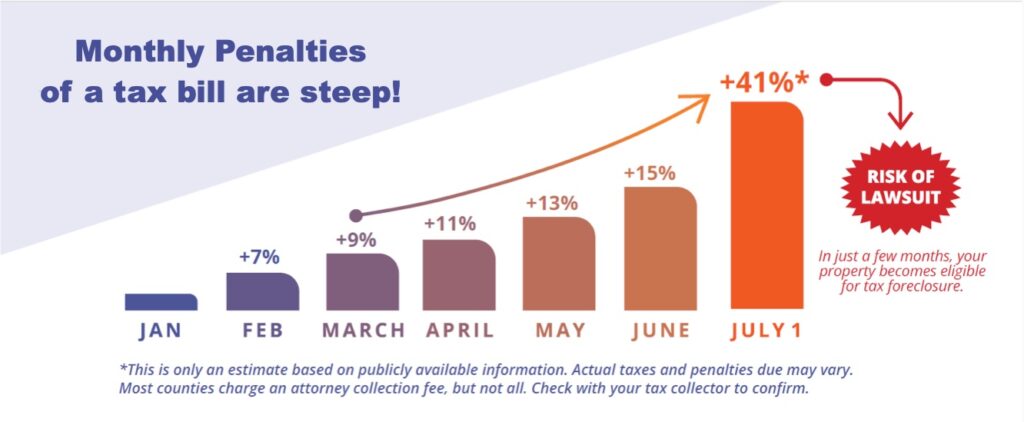When your property taxes seem to be skyrocketing and finances are tight, many Texas homeowners can feel like there are no good financial options. With the threat of foreclosure due to delinquent property taxes, a property tax loan can often emerge as a possible safety net. But are property tax loans actually legitimate? Is a property tax loan even a good idea?
In this article you should be able to understand how a property tax loan works as well as be able to say, “Yes” or “No” to whether a property tax loan is a good idea.
Before we jump into looking at property tax loans, let’s get a picture of the problem they are attempting to solve: Penalties, Interest and Foreclosure from the County Tax Office.
The Texas Property Tax Landscape:
Property tax bills are printed on or around October 1st of each year and are considered delinquent (past due) on February 1st of the following year. On the first day of delinquency, a total of 7% in penalties and interest is added to the property tax bill. Penalties and interest continue to be added on a monthly basis at a rate of 2% per month for the next 5 months. In almost all counties, there is an additional collection penalty that gets added to the tax bill on July 1st that adds about 20% more to the tax bill.
All told, a property tax bill can increase by over 35% just in the first 5 months of delinquency, and up to almost 50% within the first year. It’s no wonder that so many property owners start to look for alternatives like property tax loans when they can’t pay their bill by the February 1st deadline. What’s worse is that once a property tax bill goes past the July 1st deadline, a property owner can be sued in a delinquent tax enforcement action and the unpaid taxing entity can pursue foreclosure.

What is a Property Tax Loan?
A property tax loan, is also known as a tax lien transfer. It is a specialized loan designed with one purpose in mind…pay off delinquent property taxes. Essentially, a lender pays the outstanding tax bill on your behalf, and you repay the lender with interest over an agreed upon period.
Your property tax bill gets paid, so the interest and penalties the tax collector was charging you come to a halt. You also avoid the potential of property tax foreclosure for nonpayment of your tax bill. If you were already in property tax foreclosure, a property tax loan generally extinguishes your entire debt, leading to a dismissal of the lawsuit.
Property tax lenders can offer far more flexibility in repayment terms than the tax collector can. So, although there are installment plans that are offered by counties directly, they can be too stringent and offer absolutely no grace. One missed payment can lead to the entire debt coming due again, immediately. It’s generally not so with a property tax loan.

What Can Cause a Property Tax Loan to Be a Bad Idea?
Here are the drawbacks to a property tax loan:
- You have to pay back the loan.
- It’s not free. It doesn’t cost nearly as much but there is a fee for services.
- If it goes unpaid, a property tax loan can result in future foreclosure.
Why is a Property Tax Loan a Good Idea?
The benefits are pretty clear:
- You save money on escalating penalties, interest and fees.
- You avoid any near-term property tax foreclosure.
- You’re able to customize a repayment plan that fits your budget.
- Property tax lenders are often far more flexible on late payments.
- You get immediate relief from the pressure of looming payment deadlines.
No one likes to pay Taxes, especially property taxes. When a property tax bill becomes delinquent and there’s the potential of losing your home, it can seem hopeless. A property tax loan can keep you in your home and set up with manageable monthly payments you can afford. A property tax loan is a good financial option as it has helped hundreds of thousands of people protect their property and their pocketbook.
Want a tax expert to help you figure out whether or not a property tax loan is a good idea for you and your situation?
All it takes is 30 seconds to provide your address and find out.